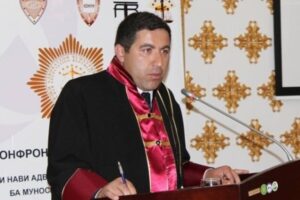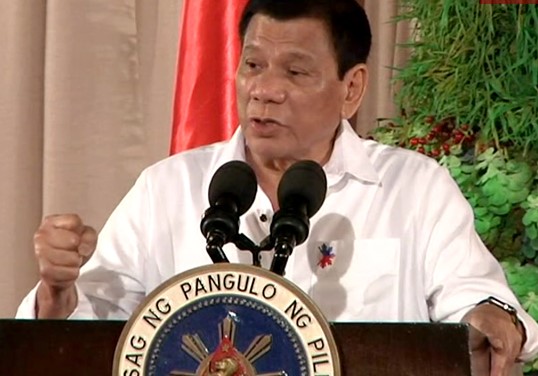
Apr 10, 2018 | News
The ICJ today condemned a threatening statement made by Philippine President Rodrigo Duterte attacking Chief Justice Maria Lourdes Sereno of the Philippines Supreme Court.
The ICJ said that the President’s remarks constituted an assault not just on the Chief Justice, but on the independence of the judiciary in the country.
The ICJ urged President Duterte to respect judicial independence and not to exert political pressure on any government official or agency to undermine the independence of the judiciary.
In a press conference on 9 April 2018, President Duterte told reporters: “I’m putting you on notice that I’m your enemy and you have to be out of the Supreme Court.”
He also called on the House of Representatives to expedite impeachment proceedings presently underway against Chief Justice Sereno.
“It is absolutely unacceptable for President Duterte to make such a statement not only because it constitutes direct intimidation of the Chief Justice, but the chilling effect it may have on other independent judges who carry out their professional duties,” said Emerlynne Gil, Senior International Legal Adviser of ICJ.
“By expressing his personal feelings against the Chief Justice and by directing the House of Representatives to accelerate the impeachment proceedings, the President is actively influencing and interfering with the functions of other co-equal branches of government,” Gil added.
The ICJ reminds President Duterte that as enunciated in the UN Basic Principles on the Independence of the Judiciary, “[i]t is the duty of all governmental and other institutions to respect and observe the independence of the judiciary.”
The Principles affirm that the judiciary must be able to carry out its work “without any restrictions, improper influences, inducements, pressures, threats or interferences, direct or indirect, from any quarter or for any reason.”
The ICJ strongly urges President Duterte to retract his comments and to refrain in the future from making any statements attacking individual judges or in any way interfering with the independence of the judiciary.
Contact
Emerlynne Gil, Senior International Legal Adviser, t: +662 619 8477 (ext. 206) ; e: emerlynne.gil@icj.org.
Background
In September 2017, two impeachment complaints against the Chief Justice were filed before the Committee of Justice of the House of Representatives, the Lower House of Congress.
The Committee of Justice approved only one of the complaints, which is scheduled to be put before the plenary of the House of Representatives in May 2018 when Congress resumes its session.
If it obtains one-third vote of all members in the House of Representatives, the articles of impeachment will be transmitted to the Senate, which is the Upper House of Congress.
Any impeachable officer may be removed from office by a vote of two-thirds of all the members of the Senate sitting as the impeachment court.
Some of the points raised in the approved impeachment complaint are the Chief Justice’s failure to report certain income in her statements of assets, liabilities and net worth (SALN), allegations of use of public funds to finance her extravagant and lavish lifestyle, and manipulation of judicial appointments for personal and political reasons, among others.
The Chief Justice maintains she correctly filed her SALNs. She also further claims that the other allegations in the impeachment complaint are baseless or mere fabrications.
In March 2018, the Philippines’ Solicitor General Jose Calida filed a petition before the Supreme Court questioning the Chief Justice’s appointment due to her alleged failure to fully disclose her wealth. Oral arguments on this petition were made on 10 April 2018.
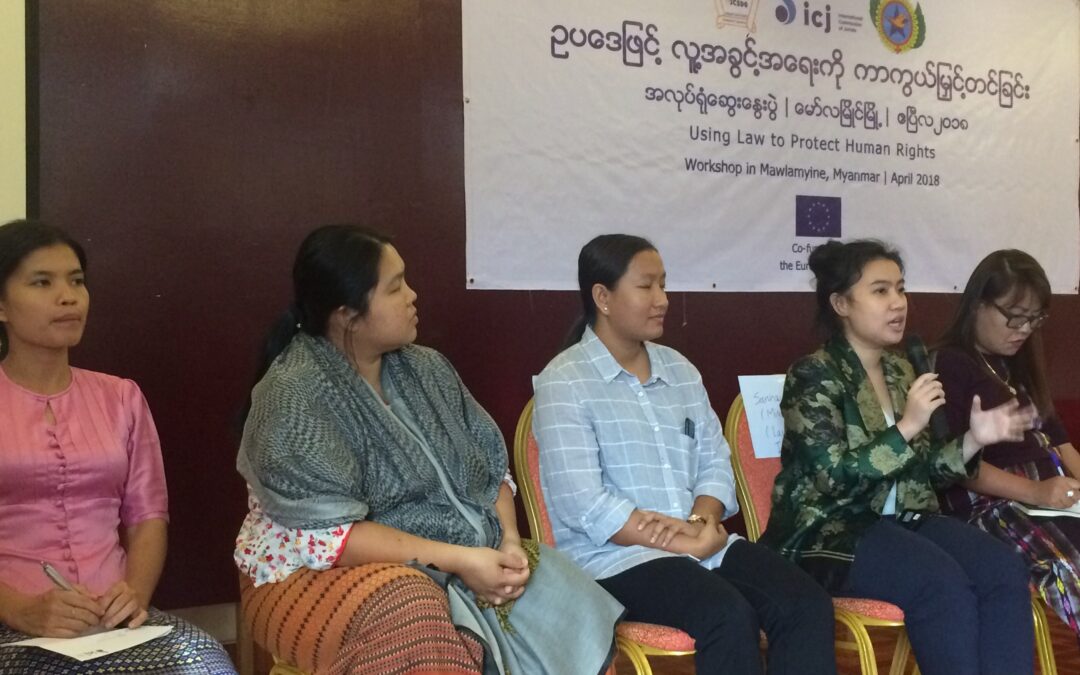
Apr 9, 2018 | News
Prior to this workshop, on 6 April the ICJ met with the Mon State High Court, including its Chief Justice.
Legal advisers from the ICJ had a constructive discussion with the justices about judicial reform in Myanmar, including the role of lawyers and civil society, as well as jurists, in advancing accountability and access to justice.
The two-day workshop aimed to identify challenges and opportunities for human rights advocacy using law, and to encourage the building of relationships and networks between lawyers and civil society.
The workshop considered strategic litigation concepts and case studies in the region. It also discussed the landscape of rule of law and justice in Myanmar, particularly the experiences regarding access to justice of some sixty participants from Mon State.
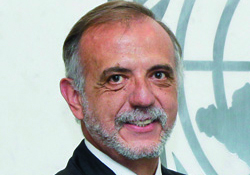
Apr 4, 2018 | Comunicados de prensa, Noticias
La CIJ está hondamente preocupada ante la falta de independencia de los miembros de la comisión de postulación para la elección de fiscal general.
Desde el 27 de agosto de 2017, cuando el Presidente de la República declaró “persona non grata” al Comisionado de la Comisión Internacional contra la Impunidad (CICIG), Iván Velásquez (foto), el Estado de Derecho de Guatemala viene siendo seriamente afectado por diferentes funcionarios al más alto nivel.
En dicha ocasión, la Corte de Constitucionalidad jugó un papel primordial en la defensa del Orden Constitucional y a favor del rescate del Estado de Derecho, al emitir varias resoluciones que lograron detener las acciones ilegítimas, que intentaron implementar al más alto nivel, el Presidente de la República y las y los diputados del Congreso de la República, para consolidar la impunidad.
En este contexto, se ha llevado a cabo la primera fase de la elección de Fiscal General por parte de la Comisión de Postulación. Informes, como el de la organización “Insight Crime”, señalan que los miembros de la Comisión de Postulación para la elección de Fiscal General, en lugar de actuar para cumplir correctamente con su mandato constitucional y coadyuvar para que el Estado de Guatemala logre alcanzar el bien común, lo hacen únicamente para satisfacer intereses de grupos vinculados al poder político, económico o militar.
Este actuar arbitrario socava el Estado de Derecho y provoca que la ciudadanía en general pierda la credibilidad en las instituciones de justicia y en el Estado de Derecho.
La CIJ considera oportuno recordar, en este momento del proceso de elección de Fiscal General, a los miembros de la Comisión de Postulación, que son funcionarios públicos sujetos a la Constitución Política de la República de Guatemala, a los Convenios internacionales de derechos humanos ratificados por el Estado de Guatemala, a las leyes ordinarias y a las decisiones de la Corte de Constitucionalidad en la materia.
La Constitución prescribe que el nombramiento en empleos o cargos públicos sólo se debe hacer sobre “razones fundadas en méritos de capacidad, idoneidad y honradez” (artículo 133).
En ese contexto, la CIJ recuerda el precedente de la elección de Fiscal General en el año 2010, cuando la Corte de Constitucionalidad ordenó repetir y reiniciar todo el proceso. En dicha oportunidad, varios de los comisionados tuvieron que inhibirse y se retiraron del proceso. Cuatro de dichos comisionados, vuelven a integrar hoy la Comisión de Postulación, lo cual introduce más dudas acerca de la legitimidad del proceso.
La CIJ recuerda que, para la realización de investigaciones independientes e imparciales, que garanticen el acceso a la justicia de las víctimas de los delitos y para romper el círculo de la impunidad, es fundamental que la Fiscalía pueda llevar a cabo su labor de modo independiente, autónomo e imparcial.
En ese sentido la Comisión Interamericana de Derechos Humanos y el Relator de las Naciones Unidas para la Independencia de los Magistrados y Abogados, han señalado que la relación de dependencia que puedan tener la Fiscalía respecto de otros órganos – como el Poder Ejecutivo- puede tener un impacto negativo en su actuación independiente e imparcial, socavar la efectividad de las investigaciones y ser un factor de impunidad.
La CIJ considera que el “pacto de impunidad” que está en marcha, pretende cooptar al Ministerio Público y afectar el buen trabajo que realiza el comisionado Iván Velásquez, a favor de la lucha contra la impunidad.
De llegar a ser electo un o una Fiscal General que no reúna los requisitos establecidos en el artículo 113 de la Constitución, el daño a la sociedad guatemalteca en su conjunto, puede llegar a ser de múltiples dimensiones, difíciles de cuantificar y causar “daños irreparables al sistema de justicia”, por su falta de independencia frente a cualquiera de los tres poderes del Estado o por su compromiso de defender los intereses de grupos del poder político, económico, militar o del crimen organizado.
La CIJ esta hondamente preocupada por el hecho de que exista un potencial conflicto de intereses por parte del Presidente de la República en el proceso de seleción y nombramiento del Fiscal General, toda vez que el primer mandatario ha sido sido cuestionado por su posible involucramiento en el Caso Hogar Seguro, en el que resultaron muertas 41 niñas, hechos que deben ser investigados por el Ministerio Público y además, su hijo y hermano están siendo procesados por casos denunciados por el Ministerio Público y vinculados a la lucha contra la corrupción.
Ramón Cadena, Director de la CIJ para Centro América, expresó: “La decisión final de la Comisión de Postulación deberá estar bien fundamentada y de ninguna manera podrán elegir personas que no reunan las condiciones previstas por el artículo 113 de la Constitución, que generen la más mínima duda con respecto a su independencia, honestidad e idoneidad o que resulten ser parte del pacto de impunidad existente.”

Apr 3, 2018 | News
The secret military trials of civilians charged with terrorism-related offences are a continuing breach of Pakistan’s international human rights obligations, the ICJ said today.
Military courts were first empowered to try civilians for certain terrorism-related offences on 7 January 2015 by the 21st amendment to the Constitution and amendments to the Pakistan Army Act, 1952, which were in operation for a period of two years.
One year ago, on 31 March 2017, President Mamnoon Hussain signed into law the 23rd amendment to the Constitution to renew military courts’ jurisdiction over civilians until 6 January 2019.
“The renewal of military trials for civilians accused of terrorism last year has only weakened the rule of law, and undermined the right to fair trial and equality before the law in Pakistan,” said Matt Pollard, ICJ’s Senior Legal Adviser.
“Pakistan should end the role of military courts in such cases, and instead strengthen the ability of ordinary courts and law enforcement to ensure investigations and trials that are both fair and effective, in line with its domestic law and international human rights obligations,” he added.
According to the military’s media office and information collected by the ICJ, military courts have convicted 346 people since January 2015, out of which 196 people have been sentenced to death and 150 people have been given prison sentences.
At least 56 people have been hanged. Only one person has been acquitted.
The ICJ has documented serious fair trials violations in the operation of military courts, including: denial of the right to counsel of choice; failure to disclose the charges against the accused; denial of a public hearing; failure to give convicts copies of a judgment with evidence and reasons for the verdict; and a very high number of convictions based on “confessions” without adequate safeguards against torture and ill treatment.
Such use of military courts to try civilians is inconsistent with international fair trial standards, and the imposition of the death penalty after such trials violates the right to life.
Families of more than a hundred people convicted by military courts have alleged the convicts were denied a right to a fair trial in petitions to the Supreme Court and various high courts in the country.
Despite acknowledging possible denial of fair trial, the ordinary courts have thus far refused to provide relief to the petitioners due to their lack of jurisdiction over military courts.
The expansion of the jurisdiction of military tribunals through the amendments to the Constitution and the Pakistan Army Act were a part of the Pakistani government’s 20-point “National Action Plan”, adopted following the horrific attack on the Army Public School in Peshawar in December 2014.
The NAP contemplated military courts only as a short-term “solution” to try “terrorists”, on the basis that they would be operational only for a short period during which the Government would bring about necessary “reforms in criminal courts system to strengthen the anti-terrorism institutions.”
However, with less than a year left before the extension under the 23rd Constitutional Amendment is set to expire, no such reforms have taken place.
Contact
Matt Pollard, ICJ Senior Legal Adviser and UN Representative (Geneva); e: matt.pollard@icj.org
Reema Omer, ICJ International Legal Adviser for South Asia (London), t: +447889565691; e: reema.omer@icj.org
Background
The 23rd constitutional amendment allows military tribunals to try civilians who allegedly belong to “a terrorist group or organization misusing the name of religion or a sect” and are suspected of committing a number of offences, including: abducting any person for ransom; raising arms of waging war against Pakistan; causing any person injury or death; using or designing vehicles for terrorist attacks; creating terror or insecurity in Pakistan; and attempting, aiding or abetting any of these acts.
In July 2017, in its Concluding Observations after Pakistan’s first periodic review under the International Covenant on Civil and Political Rights (ICCPR), the UN Human Rights Committee stated that it was concerned by the extension of the jurisdiction of military courts over civilians and allegations of fair trial violations in military courts’ proceedings.
The Human Rights Committee recommended that Pakistan “review the legislation relating to the military courts with a view to abrogating their jurisdiction over civilians and their authority to impose the death penalty” and “reform the military courts to bring their proceedings into full conformity with articles 14 and 15 of the Covenant in order to ensure a fair trial.”
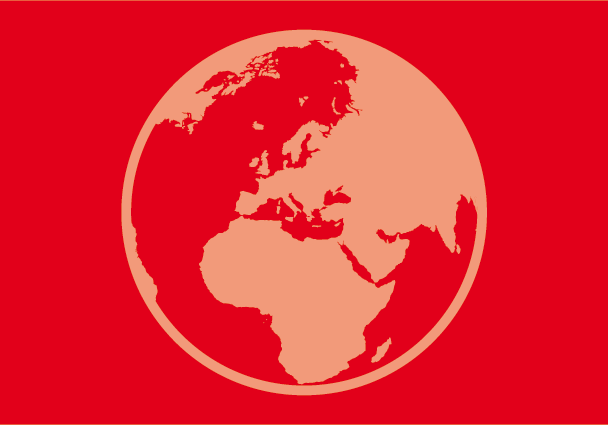
Apr 3, 2018 | Events, News
The ICJ will present a panel discussion on the continued role of the rule of law in the 70th anniversary year of the Universal Declaration of Human Rights on Monday 16 April, 18.30-20.00, Room C1, Maison de la Paix, Geneva.
In a global context where pushback against rights protection is becoming increasingly more pronounced this panel discussion, organized in co-ordination with the Graduate Institute and supported by the Permanent Mission of Germany, will address critical areas of concern for the rule of law in upholding the universal rights set out in the UDHR 70 years ago.
The event, composed of diplomats, academics and legal experts from around the world, will look at issues around the realisation of rights set out in the UDHR, particularly in relation to gender and women’s rights, and will consider how these have been implemented domestically as well as how breaches of the UDHR have been treated as international crime.
Panellists will also comment on the role of the rule of law as set out in the Sustainable Development Goals in ensuring rights protection as an essential element of sustainable development.
The event will also assess how problems in human rights frameworks can be addressed in a way that strengthens the rule of law and human rights and will consider the increasing role of developing countries in taking ownership of the international rights framework initiated by the UDHR.
Introduction:
- Saman Zia-Zarifi, Secretary General of the ICJ
Panellists:
- Carlos Ayala, ICJ Vice-President and former Chair of the Inter-American Commission on Human Rights
- Andrew Clapham, Professor of Public International Law, The Graduate Institute, Geneva; Member of the UN Commission on Human Rights in South Sudan
- Luis Gallegos, Permanent Representative of Ecuador to the United Nations in Geneva
- Sanji Monageng, ICJ Commissioner and Judge at the International Criminal Court, The Hague
- Patricia Schulz, Member of the UN Committee on the Elimination of Discrimination against Women
Moderator:
- Robert Goldman, Acting ICJ President and Professor of Law, Washington College of Law, American University, Member of Eminent Jurists Panel on Terrorism, Counter-terroism and Human Rights
Sign up to the event via the link on the Graduate Institute’s website.
Universal – Rule of Law UDHR 70 – News – Events – 2018 – ENG (Event flyer in PDF)








